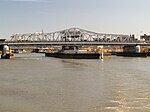Harlem African Burial Ground

The Harlem African Burial Ground was a segregated cemetery created in 1668 for the burial of enslaved and freed Africans in the Dutch colony of Harlem, located at what is presently 2460 2nd Avenue in New York City. It was maintained until 1858 by the Elmendorf Reformed Church, the successor of the Low Dutch Reformed Church of Harlem which founded the cemetery. Although historians of New York and Harlem, as well as church historians, were aware of the cemetery's existence, the East Harlem community was largely unaware of its history until the late 1990s when the New York City Department of Transportation (DOT) began planning the reconstruction of the nearby Willis Avenue Bridge. The investigation revealed that the construction might affect a colonial site and historic burial ground which was under the decommissioned East 126th Street Bus Depot. Per New York State law, the DOT conducted a Phase I-A historical and archeological survey, which verified the existence of the burial ground.
Excerpt from the Wikipedia article Harlem African Burial Ground (License: CC BY-SA 3.0, Authors, Images).Harlem African Burial Ground
East 126th Street, New York Manhattan
Geographical coordinates (GPS) Address Nearby Places Show on map
Geographical coordinates (GPS)
| Latitude | Longitude |
|---|---|
| N 40.8028 ° | E -73.9312 ° |
Address
East 126th Street 334
10035 New York, Manhattan
New York, United States
Open on Google Maps



